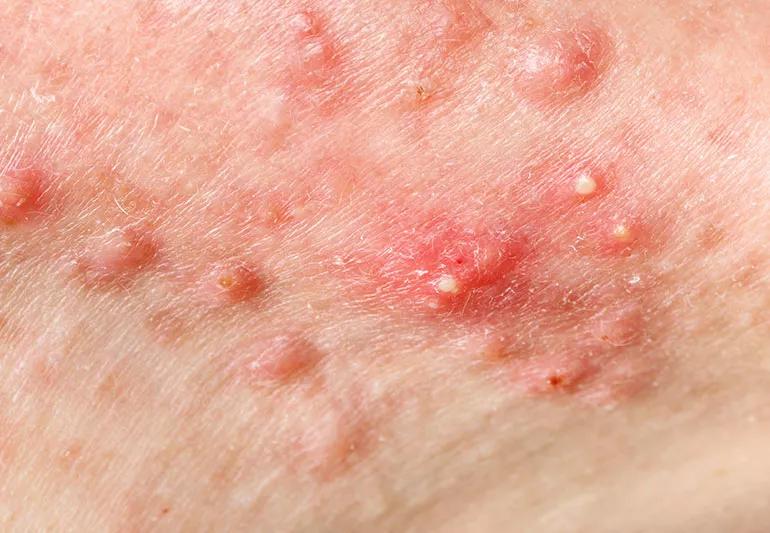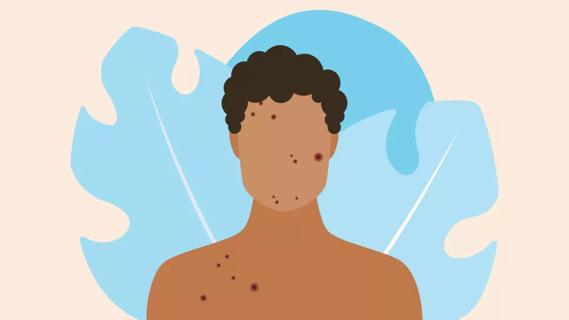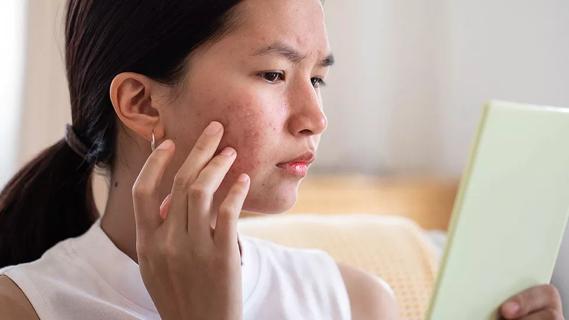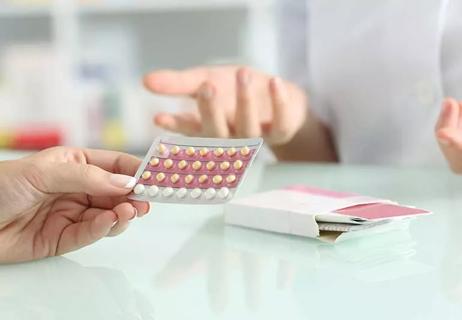Find out the best way to treat this skin condition from a dermatologist

If you’re an armchair pimple popper, meaning you love watching those extraction videos on YouTube, you’ve seen blackheads, whiteheads, solar comedones, lipomas and most likely, cystic acne.
Advertisement
Cleveland Clinic is a non-profit academic medical center. Advertising on our site helps support our mission. We do not endorse non-Cleveland Clinic products or services. Policy
Cystic acne develops deep down in the skin and can cause large, red and painful lumps. It can be hard to manage alone. And while you may be tempted to conduct bathroom mirror surgeries, trying to extract cystic acne will only lead to scarring, inflammation and even more irritation.
Do any home remedies for cystic acne work and what can be done to prevent this skin condition? Dermatologist Jonathan Braue, MD, explains what hormonal cystic acne is and weighs in on if certain home remedies for it are effective.
“Acne is multi-pathogenic in the sense that not only does it have to do with the maturation of our skin and the hair follicle, but also, there’s a hormonal component to it,” says Dr. Braue.
Hormones can affect keratinization, which is the process by which your skin makes a protein called keratin and then sloughs dead skin off. Keratinization also deals with how much sebum is produced. Sebum is a waxy substance that helps moisturize and protect your skin. It’s produced by sebaceous glands.
“What occurs, for genetic reasons and environmental reasons, is atypical keratinization in the lining of the hair follicle. When hair follicles get plugged, sebaceous glands produce even more sebum. Plugged follicles are ideal settings for inflammation, bacteria and acne. And when you get an overgrowth of that bacteria in an already abnormal, inflammatory setting, you get more and more inflammation. With true cystic acne, the inflammation is quite out of control.”
Advertisement
Instead of taking the drugstore route to battle cystic acne, Dr. Braue strongly suggests starting with a dermatologist. Over-the-counter products can work when combined with a comprehensive treatment plan, but he says that a dermatologist can step in way before scarring or skin pigmentation problems set in.
“If you are living with true cystic acne, get a good dermatologist and don’t mess around with over-the-counter products. Now, there are certain over-the-counter solutions that I do recommend to patients in addition to their treatment plans, but the problem with messing around with cystic acne is that it can lead to scarring and dyspigmentation most of the time.”
Dr. Braue adds that this is quite common with skin of color. People with more melanin in their skin tend to experience more hyperpigmentation or discoloration because of the inflammation that’s associated with cystic acne.
Another reason Dr. Braue recommends seeing a dermatologist or even your healthcare provider first — cystic acne could be a sign that something else is going on.
“It’s important to get checked out by a dermatologist, or at the very least, your primary care physician who can appropriately refer you to a dermatologist. Sometimes, people who have significant inflammation may have another underlying condition. For example, it’s not uncommon to see younger women or teens who have polycystic ovary syndrome (PCOS) and cystic acne. If you’re attempting to treat cystic acne with over-the-counter solutions, you’re not going to take into consideration that there could be an issue with your menstrual cycle or an issue that could lead to a metabolic disorder.”
According to Dr. Braue, the foods that are often associated with acne haven’t been scientifically linked to cystic acne.
“Sugar, chocolate and fast food always get a bad rap, but I haven’t seen any great scientific data that links them to cystic acne. So, I can’t say that if you eat fast food three times a week or eat too much chocolate, your acne is going to be much worse. There isn’t enough proof that these foods are direct causes.”
However, if you notice that your acne flares up when you eat certain foods, your healthcare provider or dermatologist might encourage you to avoid them.
The one thing that Dr. Braue has noticed is a connection between acne and skim milk.
“From the available data that we have, there seems to be a link between the severity of acne and the ingestion of skim milk. I do always ask patients if they’re drinking a lot of skim milk or if they’re taking whey protein. If they are, I counsel them on finding an alternative.”
From ice to aspirin masks, the internet seems to have a lot of ideas for how to treat cystic acne at home. Dr. Braue weighs in on some popular suggestions.
“If you have a more painful area of the skin, icing is never a bad idea. I encourage patients to ice their skin for a variety of reasons — from itch to pain, to even a painful lesion of acne. Should you decide to ice your skin, don’t put ice directly on it because you can end up burning the skin. Wrap your ice pack in a washcloth or even a thicker paper towel first. Gentle icing for 10 minutes or so isn’t a bad idea. If it’s causing more pain or the area is starting to go numb, stop immediately.”
Advertisement
“This one worries me because it encourages people to crush up aspirin to make a face mask and they could end up with a higher concentration of it in one area versus another. We use salicylic acid, which is somewhat a cousin of acetylsalicylic acid (aspirin) to treat acne, but it’s a low percentage. I definitely wouldn’t crush up a bottle of aspirin and put it on my face.”
“It’s not something that I would typically recommend for cystic acne. I do recommend diluted vinegar soaks for certain types of infections on the lower extremities because vinegar potentially has some antibacterial properties. In comparison to the aspirin mask, I would almost recommend a patient try this, especially if the vinegar is diluted. But it’s not something I that I would suggest that a patient try right away because it could have the potential to be very drying or irritating.”
“If you have mild acne, there is data out there that shows that tea tree oil can be helpful. With cystic acne, when someone is looking to treat it ‘naturally,’ I always mention that just because something is natural doesn’t mean that it’s necessarily good for you. With tea tree oil, some people are allergic to limonene, a compound that’s found in it. This allergy can cause contact dermatitis in addition to their acne. So again, if someone has true cystic acne, they need to see a dermatologist or their healthcare provider first.”
Advertisement
Since we’re all different, there isn’t a one size fits all solution for cystic acne. When you talk to a dermatologist, you can work together to develop a treatment plan that works for you.
Dr. Braue says that isotretinoin (once branded as Accutane™) is still widely used to manage cystic acne and recent studies suggest that there isn’t a direct link between it and an increase in depression. If you opt to go this route, he usually recommends just cleansing the skin with something very mild and not an acne wash.
Other treatment options might include antibiotics, tretinoin (Retin-A®), or tazarotene (Tazorac®).
Dr. Braue has stressed this a number of times so it’s worth repeating — don’t mess with cystic acne. It doesn’t matter if you’ve watched hours of pimple extraction videos. If you need an area drained, leave that to a professional.
“Picking or popping cystic acne can lead to scarring and that can lead to dyspigmentation. Also, when you do this, not everything comes out and you end up spreading some of the inflammation around which isn’t ideal either. If you’re considering draining an acne cyst at home, I definitely don’t encourage it.”
Advertisement

Sign up for our Health Essentials emails for expert guidance on nutrition, fitness, sleep, skin care and more.
Learn more about our editorial process.
Advertisement

It’s best to avoid picking at zits, which can damage your skin (though there are ways to minimize the risk)

This medication only works well for short periods of time and when paired with other treatments

‘Zit stickers’ can help heal a new or popped pimple, but they’re limited when it comes to managing acne

Try exfoliating and using salicylic acid to treat this pesky skin care issue

Wear light, breathable clothing, shower after you exercise and change your sheets regularly

As you age, hormones can continue to play a big role in breakouts

Some remedies might help banish breakouts, but others are best avoided

Birth control pills with estrogen are best for fighting hormonal acne

Even small moments of time outdoors can help reduce stress, boost mood and restore a sense of calm

A correct prescription helps your eyes see clearly — but as natural changes occur, you may need stronger or different eyeglasses

Both are medical emergencies, but they are very distinct events with different causes